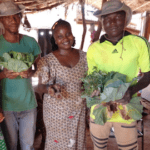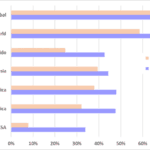Reshaping Africa’s Food Systems: Three Opportunities to Drive Sustainable, Inclusive and Scalable Impact
There is probably no single sector with as much influence on sub-Saharan Africa’s future as agriculture. As of 2022, it employed more than half of the region’s labor force. However, the continent is still plagued by low yields, and is home to 60% of the world’s uncultivated arable land. Moreover, the sector is constrained by highly fragmented value chains, a large agricultural finance gap and limited value addition (i.e., the processing of raw crops into higher value products), among other factors. Agriculture and food systems could be the engine of the continent’s inclusive economic growth — yet alarmingly, the industry is stalling.
A lack of resilience is one key reason for this issue. Over the past few years, we have watched as one external shock after the other — from the global pandemic to the war in Ukraine — have buffeted Africa’s farmers and the food systems they support. Global supply crises like a mass shortage of fertilizer have left farms with shriveling yields, which in turn has led to rising hunger. Extreme weather is only adding fuel to the fire. Over the last three years, for instance, East Africa has suffered its worst drought in four decades, displacing over 1.4 million people in Somalia alone, and leaving more than 23 million people in danger of starvation. Smallholder farmers have done their best to adapt, but most still lack the knowledge and tools to confront these unprecedented challenges.
Over more than a decade, Open Capital has worked on 450+ agriculture and food systems projects across Africa, partnering with development organizations, foundations, businesses, investors, governments and, of course, farmers themselves. This work has pointed us to one pivotal truth: The sector is facing a critical juncture, and actions taken over the next 10 years have the power to radically alter the continent’s future, creating one of the world’s great development success stories — or leaving an entire region behind.
To be clear, despite the current circumstances, we see many reasons for optimism. Innovative thinking is already starting to transform Africa’s food systems. Importantly, the development community and governments are increasingly embracing the important role of the private sector in sustainable development, prioritizing solutions that are scalable, and that consider both impact and financial sustainability. We are excited to share three ideas that have the power to help drive the future of agriculture on the continent in the decades to come — especially if they are implemented in tandem.
1. Reboot market systems thinking
Systems thinking has become a powerful driving force in agricultural development in Africa. It has altered the way we see the continent’s food systems, emphasizing important linkages between farmers, markets, consumers and ecosystem players, and helping identify where those links are broken or incomplete. By casting our gaze holistically across the systems that farmers and agribusinesses are a part of, we have been better able to identify the root causes of market failures and correct for them. This leads to the kind of change that goes far beyond the lifespan of an individual project or investment.
But despite the formidable potential of this developmental approach, in our view its application has been limited and inconsistent. Interventions can often be scattershot, niche, uncoordinated and/or inadequately sequenced — for instance, providing farmers with agricultural inputs, without first creating the market linkages necessary for them to sell their increased outputs. Systems thinking can address this lack of organization, but it requires a major reboot to how we “do” development work in the agricultural sector. For one, it demands a differentiated approach to program design and longer-term planning, along with a shift in success metrics, and in the timelines against which they are measured. It also requires us to coordinate and cooperate much more closely across the development community and with the private sector, pushing all key stakeholders out of their silos and comfort zones.
This transformation in the development sector’s mindset is daunting, but our experience shows it is also achievable, particularly when we work with the private and public sectors to anchor the change. For instance, Open Capital recently supported 12 agribusinesses in Uganda as part of a donor-funded inclusive markets program. Our technical assistance to these companies ran a wide gamut, including efforts to: design improved farmer outgrower networks to boost sourcing; link farmers to relevant sources of capital to scale production capacity; design strategies to connect them to local and export markets; and embed a gender-inclusive lens across operations. The idea behind this broad range of support is to make sure these agribusinesses don’t just succeed as individuals, but become better integrated into the market systems they operate in. We hope that this, in turn, will benefit stakeholders all along their supply chains long after the program has ended.
2. Bank on climate finance opportunities
From historic droughts to powerful cyclones, extreme weather is putting Africa’s food systems in a dangerous cycle. Farmers and agribusinesses, already struggling to support the continent’s growing population, are now forced to confront the added shocks of climate change. Alarmingly, though Africa’s food systems are on the frontlines of climate change, they remain on the peripheries of climate finance. As of 2020, the agriculture, forestry and land-use sectors received a dismal 3% of all climate financing globally. Meanwhile, the adoption of climate-smart practices and tools, although rising, remains limited, while new mandates like the European Union Deforestation Regulation are expected to place added traceability and reporting burdens on actors along the supply chain, including smallholder farmers, to demonstrate climate compliance.
Clearly, the agricultural sector is in desperate need of more financing, and stands to strongly benefit from it, underscoring the importance of climate finance as an additional source of funding. The development sector’s ability to unlock this funding will rest in part on how well we can show what really works — particularly in areas currently popular with donors, such as regenerative agriculture and Productive Use of Energy, which have yet to demonstrate scale. In order to develop this robust evidence base, we must make sure every climate-smart agriculture intervention is carefully designed and adapted to local contexts, keeping the realities of target beneficiaries front and center, and viewing them as what they are: rational decision makers. Meanwhile, working with innovative businesses in this space will remain critical, to identify and scale impactful and economically viable solutions to adapt to and mitigate climate change.
We are heartened by the growing ecosystem of climate-smart donors and businesses in agriculture across the continent, which are serving as incubators for new climate services and delivery approaches (e.g., “as-a-service” models). Through our work, we have led donors to better understand the climate finance opportunity for agriculture and to deploy their capital in more catalytic ways. Meanwhile, we have supported dozens of innovative businesses in providing services like improved inputs, agroforestry, solar cold chain, irrigation, information services and index-based insurance. Together, these businesses serve hundreds of thousands of farmers with context-relevant solutions for adapting to climate change and improving their lives. For example, we worked with the World Bank-funded Accelerating Impacts of CGIAR Climate Research for Africa initiative in Zambia to support the efforts of a cohort of climate-smart agribusinesses to improve their operations and pursue growth financing, positioning them to scale their innovations over time.
3. Merge Technologies into Existing Structures
Technology can play a crucial role in changing African food systems for the better. To be clear, we aren’t talking about quick “techno-fixes” that address surface-level challenges while ignoring the factors that perpetuate those issues. Instead, we see technology as a tool to power all kinds of transformations in the agricultural sector, when properly leveraged and adequately contextualized — from helping farmers and businesses to better access inputs and finance, to circumventing broken infrastructure. Particularly in places where current technological uptake in agriculture is low, fusing traditional and digital tools is often the most practical approach. This could mean further integrating agtech and fintech with traditional microfinance institutions and savings and credit associations, introducing solar cold storage as-a-service at informal food markets, developing efficient digital marketplaces, or using digital tools like mobile-based messaging to complement traditional extension and advisory efforts targeting farmers. Crucially, technology should never be implemented just for the sake of doing something novel: Rather, it should have a demonstrable value proposition for adopters.
That is why we have focused significant time on designing new programs and studying the commercial viability and investment case for new agricultural technologies. For example, we recently worked with a global NGO to develop a number of investment opportunities with agricultural technologies at their heart, including solar-powered productive use equipment and digital platforms for improved trading of produce. We have worked with dozens of innovative agtech businesses, supporting their efforts to provide solutions in digital agriculture, mechanization and improved inputs, and we’ve been excited to see many of these businesses and solutions scale.
As these examples make clear, the task ahead of us is challenging, but equally exciting. Few sectors offer such potential to transform Africa’s future in the next decade as agriculture. But we have to act fast. To make the changes necessary to ensure the continent’s food security, the sector needs more creative thinking, more cooperation and more financial support. We believe these are realizable goals, and we look forward to working with our clients and partners to achieve them.
Neil Wood is a Partner and Head of the Agriculture and Food Systems Practice, Oscar Garza is Principal and Co-Lead of the Agriculture and Food Systems Practice, and Hanna Dohrenbusch is a Senior Project Leader and a key member of the Agriculture and Food Systems Practice at Open Capital.
Photo via Open Capital.
- Categories
- Agriculture, Energy, Environment, Investing, Technology



